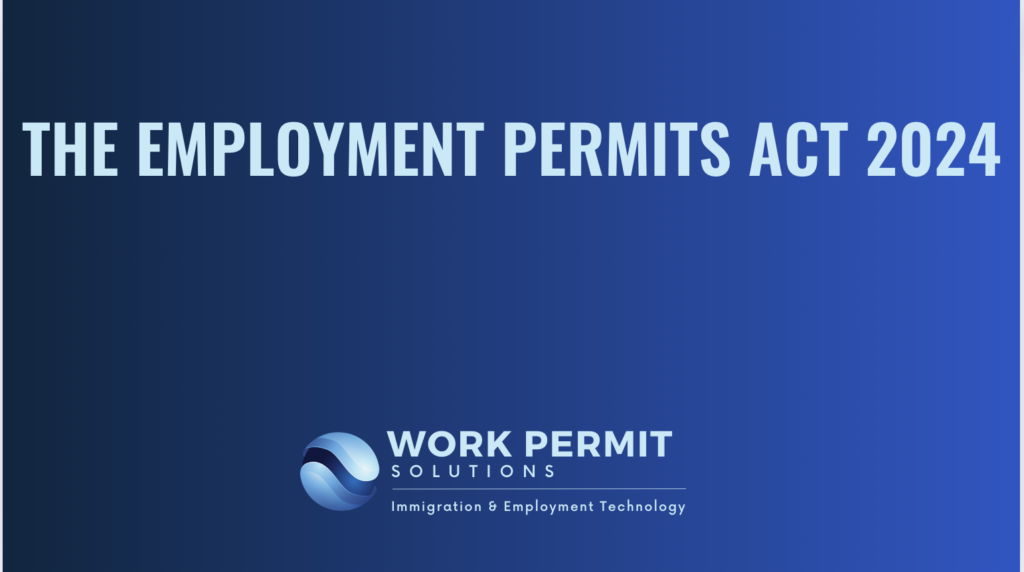The Employment Permits Bill 2022, recently enacted as the Employment Permits Act 2024 (June 25th), introduces several key reforms aimed at modernising and streamlining Ireland’s employment permit system. These changes are designed to enhance flexibility, responsiveness, and fairness in the process of hiring non-EEA nationals. Here are the key changes introduced by this legislation:
A commencement order is required before the Employment Permits Act 2024 can come into force. Unfortunately, there has been no indication of a date regarding a commencement order.
Consolidation of Legislation
The Act consolidates previous Employment Permits Acts (2003, 2006, and 2014) into a single piece of legislation. This consolidation simplifies the legal framework, making it slightly easier for individuals and companies to understand the requirements. As you may or may not know, such applications seem straightforward, but this is a far cry from reality. Operational details will now be handled through regulations, allowing for more agile adjustments.
Introduction of New Permit Types
The new legislation introduces two significant permit types:
- Contract for Service Employment Permit: This permit allows non-EEA Nationals employed outside Ireland by contractors or subcontractors to perform duties in Ireland under a service agreement. This is aimed at accommodating modern labour market practices and value chains.
- Seasonal Employment Permit: Designed for non-EEA nationals involved in seasonally recurrent employment, this permit addresses short-term/temporary labour needs in sectors like agriculture and tourism. A pilot scheme for this permit will launch in 2025, limited to specific employers, ensuring that only those who comply with the regulations can benefit from this scheme.
Revisions to the Labour Market Needs Test (LMNT)
Arguably our favourite change to the legislation. The Labour Market Needs Test has been revised to make the process more efficient. Previously, job vacancies had to be advertised in national newspapers (at a heavy cost to the entity paying). Under the new law, employers or agents acting on their behalf need to post job advertisements on two online platforms, including EURES (JobsIreland.ie), for a minimum of 28 days, with the second platform duration yet to be confirmed. This change aims to prioritise local and EEA workers whilst reducing costs for the employer.
Salary Indexation
A significant update in the Act is the introduction of salary indexation. Since January 2024, the minimum salary threshold for General Employment Permits was increased to €34,000 for the vast majority of roles with some lower increases for different sectors. Further increments are planned for 2025 and 2026 to reflect economic conditions and inflation rates, ensuring fair compensation for permit holders and enhancing Ireland’s competitiveness in attracting global talent.
Enhanced Mobility for Permit Holders
This is a topic of hot contention, but we can see both sides of the coin. We frequently come across cases whereby individuals have been treated quite poorly by their employer. To improve job mobility, the new legislation allows employees holding General or Critical Skills Employment Permits to change employers after completing nine months with their current employer. This provision reduces the risk of exploitation and provides greater flexibility for foreign workers to seek better opportunities. Even before this change in legislation, the option to leave an employer where a fundamental breakdown in employer – employee relations has occurred still exists.
Additional Conditions for Employment Permits
The Act grants the Minister the authority to specify additional conditions related to accommodation, training, and expenses for permit holders. These conditions are designed to ensure that non-EEA workers receive adequate support and development opportunities while working in Ireland.
Conclusion
The Employment Permits Act 2024 is a forward thinking piece of legislation that addresses the shifting needs of Ireland’s labour market. By consolidating previous laws, introducing new permit types, revising the dated LMNT, increasing salary thresholds, and enhancing job mobility, the Act aims to attract and retain the global talent necessary for Ireland’s economic growth. These changes benefit both employers and the economy while ensuring that non-EEA workers are treated fairly and integrated well into the Irish workforce.
These reforms are expected to make Ireland a more attractive destination for skilled professionals worldwide, helping to bridge the skills gap and foster a diverse, dynamic, and driven labour market. For more detailed information, you can refer to official sources from the Department of Enterprise, Trade, and Employment and other related entities.

